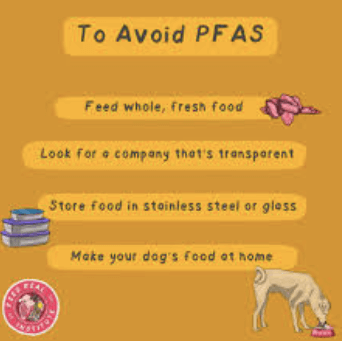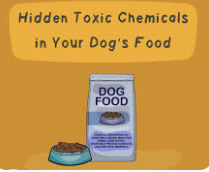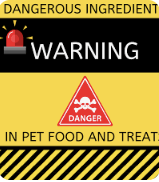More proof that kibble is toxic is emerging. Toxins are everywhere, including in the packaging of a lot of manufactured food, including kibble. A recent class action suit was filed against Nestle Purina in California's federal court PFA toxins have been found in the packaging of Nestle Purina's kibble, despite their (false) advertisement of their products being safe for consumption. The class action alleges that the packaging of their products contained per- and polyfluoroalkyl substances, called PFA's, which are linked to a host of serious metabolic health issues such as cancer, liver damage and immunotoxicity effects. You can read more about this class action here. This is more proof that kibble is toxic.
Specifically, PFA's are a group of about 12,000 compounds used to make products resistant to water, stains and heat and are known as "forever chemicals" because they don't naturally break down and accumulate in the body tissues of humans and dogs alike. I don't know about you, but "forever chemicals" accumulating in my body or my dogs' body doesn't sound like a solid game plan for a happy, healthy life.
To quantify the PFAs in kibble bags, the Environmental Working Group (EWG) authorized an independent laboratory to conduct tests for total fluorine, which is a likely indicator for the presence of PFAs and marked as parts per million, or ppm, on bags of kibble from popular brands. This is more proof that kibble is toxic.
According to this article titled, the worst offenders are Kibbles 'n Bits bacon and steak flavor at 600ppm, followed by Blue Buffalo's Life Protection Formula chicken and brown rice recipe at 150 ppm. Unsurprisingly and unfortunately, some amount of PFAs are considered to be acceptable to public health officials and there is no legal framework to quantify what this acceptable amount actually is.
Equally as unsurprising and unfortunate is the fact that big pet food companies like Nestle Purina, MARs Inc., and Hill's have not appeared to commit to stop using PFAS in their packaging. Despite pressure from some health advocates, the good old FDA has refused to ban the use of PFAS in food packaging and any efforts to do so via legislation have died in Congress.
It's truly a disservice to everyone that purchases kibble because the research on PFAS is clear: Exposure to PFAS is linked to disease. This study used data to estimate the exposure to PFAS for a random sample of 10,168 patients from the University of North Carolina Healthcare System. You can read more specifics from the study itself, but the conclusion is clear: "Exposure to PFAS is associated with a range of chronic diseases as well as multimorbidity." These chronic diseases are wide-ranging and include heart disease, cancer, hypertension and osteoporosis in humans. The same is true for our dogs. This is more proof that kibble is toxic.
There isn't definitive research that concludes that the PFAS found in packaging has migrated to the food it contains, but that's a risk that I don't think is worth taking. In my view, ZERO PFAs are the only acceptable amount when it comes to the health of my dog. In my view, anything the FDA declares should be questioned as some of their funding comes from the same companies it is supposed to regulate. This is completely unethical. So obviously the FDA is going to be way more lenient when it comes to approving metrics and products of the companies that fund them as well.
If you want your dog to be healthy, do not feed kibble because it is clear that kibble is toxic. Raw food or home cooked food is the way to go. Here are raw food brands that we recommend. We aren't affiliated with these companies, but would feed it to our dogs, which means it is species appropriate, has no fillers and will promote optimal health. Here is a recipe for home cooked food that we use when dogs are chronically illy to help them detox and feel better fast.
Donate to Bobzilla.org

$5.00
The veterinary business is business which is not in the business of curing your animal, but Bobzilla's business is. Bobzilla is committed to one hundred percent transparency in all of its scientific research into animal wellness and prevention of disease and one… read more





